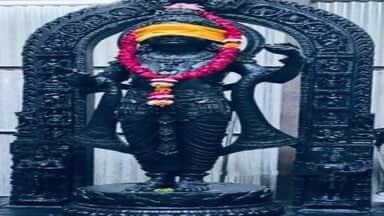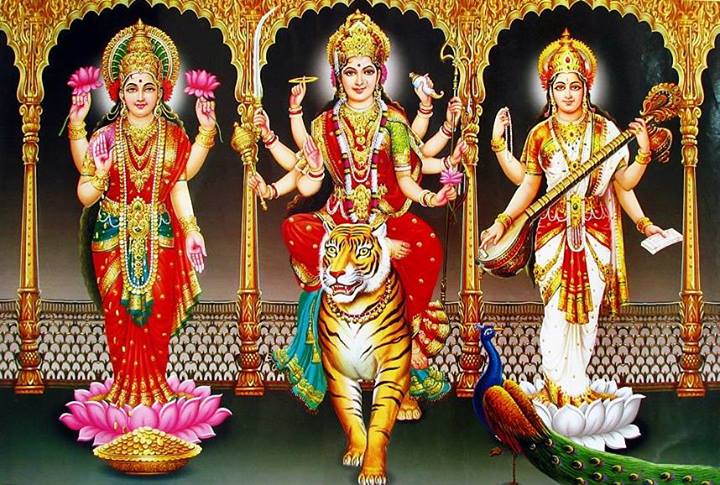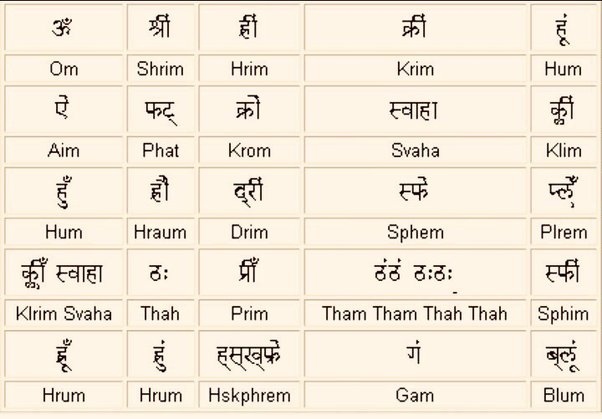Hinduism has as its source The Vedas.
Vedas have two broad classification in respect of Knowledge and Duties, Gnana Kanda and Karma Kanda.
These two are not segregated and appear throughout the Four Vedas.
One has to segregate the Karma Kanda from the Gnana Kanda, which consists of Hymns and the enquiry into the Nature of The Self, the Upanishads.
One has, in Hinduism two kinds of Duties.
One is Nithya Karma, Daily Duties that are to be performed regularly daily and another Naimithika Karma, Duties to be performed with a specific purpose and for specific occasions.
Today, we have all the Mantras and Rituals inan orderly fashion and we follow them.
The source, the Vedas are vast and the information is spread over.
Apasthamba organised it for those who live below the Geographical area Vindhya and Sathpura Range of Mountains.
But he had a pointer and for those in the Northern area of Vindhyas, there is a master file of Reference, which is not well known.
Curiously it is an Upanishad that deals with not only with the enquiry into Reality but to daily Routine and other Mantras for specific occasions.
The Mahanarayana Upanishad is in Krishna Yajur Veda.
It contains the daily duties , procedures, mantras, and Devatha Gayatris.
Gayatri mantras in Maha Narayana Upanishad.
We meditate on Mahadeva for that purpose. May that Rudra invigorate us in our action of meditating on Purusha!
May that Lord Vishnu invigorate us! [In Srivaishnava concept Narayana is Parabrahman].
This Upanishad contains several other Gayatri Mantras which are self explanatory and as follows:
There are very many Gayatree-mantras scattered all over Hindu Scriptures and contained in Stotras (divine songs).
The following popular hymn in praise of Mother Earth, consort of Lord Vishnu is chanted regularly:
This hymn has been based on the following three Vedic Mantras mentioned in Mahaa Narayana Upanishad.
Sansdyavandhan Mantras.
Aapah punantu prithiveem prithivee pootaa punaatu maam | punantu brahmanaspatir-brahma pootaa punaatu maam || Yad-ucchishtam-bhojyam yadvaa duscharitam mama | Sarvam punantu maam-aapoe-asataancha pratigraha(g)am svaahaa ||
Agnischa maa manyuscha manyu-patayascha-manyukritebhyah paapebhyoe rakshantaam | Yadahna paapamakaarsham | manasaa vaachaa hastaabhyaam | padbhyaam-udarena sisnjaa | ahastad-avalumpatu | yat kincha duritam mayi | idamaham maam-amrityoenau | satye jyotishi juhoemi svaahaa ||
Sooryascha maa manyuscha manyukritebhyah | paapebhyoe rakshantaam | yad-raatryaa paaam–akaarsham | manasaa vaachaa hastaabhyaam padbhyaam-udarena sisnjaa | raatris-tad-avalumpatu | yat kincha–duritam mayi | idamaham maam-amrityoenau | soorye jyoetishi juhoemi svaahaa ||
Invocation of Gaayatri
Aayaatu varadaa devee aksharam brahma-samhitam | Gaayatreem cchandasaam maatedam brahma jushasva nah || oejoe-aci sahoe-aci balamaci bhraajoeci | devaanaam dhaamanaamaaci visvamaci visvaayuh | sarvamaci sarvaayur-abhibhooroem gayatreem-aavaha yaami |
Sending off Gayatri
Uttame sikhare devee bhoomyaam parvata-moordhani | Braahmanebhyoe hyanujnaanam gaccha devi yathaa-sukham ||
Gaayatri Mantra
Om bhooh | Om bhuvah | Ogam suvah | Om mahah | Om janah | Om tapah | O(ga)m satyam | Om tat saviturvarinyam bhargoe devasya dheemahi | dhiyoe yoenah | prachoedayaat | Om-aapoe jyotee rasoe-amritam brahma bhoor-bhuvas-suvaroem ||
Om bhoor-bhuvas-suvar-mahar-janas-tapas-satyam tad brahma tad-aapa aapoe jyoetee-rasoe-amritam brahma bhoor-bhuvas-suvaroem ||
Om tad Brahma | Om tad Vaayuh | Om tadaatmaa | Om tat satyam | Om tat sarvam | Om tat puroer-namah ||
PRAANAAHUTI-MANTRAAH: BHUKTAANNA-ABHIMANTRANA-MANTRAAH (MEALTIME PRAYERS, CONCLUDING PRAYERS/PRAYERS FOR OFFERING FOOD TO DEITIES)
Praanoe-nivishtoe-amritam juhomi | Praanaaya svaahaa |
Apaane nivishtoe-amritam juhomi | apaanaaya svaahaa |
Vyaane nivishtoe-amritam juhomi | Vyaanaaya svaahaa |
Udaane nivishtoe-amritam juhomi | Udaanaaya svaahaa |
Samaane nivishtoe-amritam juhomi | Samaanaaya svaahaa |
Brahmani ma aatma-amritatvaaya |
Praane nivishtoe-amritam juhomi | sivoe maa visaapradaahaaya | Praanaaya svaahaa ||
Apaane nivishtoe-amritam juhomi | sivoe maa visaapradaahaaya | Apaanaaya svaahaa ||
Vyaane nivishtoe-amritam juhomi | sivoe maa visaapradaahaaya | Vyaanaaya svaahaa ||
Udaane nivishtoe-amritam juhomi | sivoe maa visaapradaahaaya | Udaanaaya svaahaa ||
Samaane nivishtoe-amritam juhomi sivoe maa visaapradaahaaya | Samaanaaya svaahaa ||
Brahmani ma aatmaa-amritatvaaya ||
Amritoe-pidhaanamsi |–You are the cover of the form of nectar. (Please wrap around the food consumed with nectar.)
AATMAANUSANDHAANA MANTRA
(Self-purifcation Mantras)
Then the following two mantras are addressed to gastric fire (Jatharaagni).
Scriptures prescribe this for chanting after Uttaraapoesana (after sipping water to conclude the meal).
Partaking of food is not for just nourishing the physical body but for supporting Self to surrender itself to the Paramaatman.
The Self is offered or surrendered to Parmaatman or Brahman and therefore this mantra is called Praanaahuti or symbolic sacrifices of five Praanas.
Sraddhaayaam Praane nivisya-amritagam hutam | Praanamannena-aapyaayasva ||
Apaane nivisya-amritagam hutam | Apaanamannena-aapyaayasva |
Vyaane nivisya-amritagam hutam | Vyaanamannena –aapyaayasva ||
Udaane nivisya-amritagam hutam | Udaanamannena-aapyaayasva ||
Samaane nivisya-amritagam hutam | Samaanamannena-aapyaayasva ||
Brahmani ma aatmaa-amritatvaaya ||
I, the believer in faith, oblate this food in the form of nectar for the sake of the vital force Praana.
Nourish Praana with that. This food of the form of nectar is offered as oblation for the sake of Apaana with faith.
Nourish Apaana with that food.
This food of the form of nectar is offered as oblation for the sake of Vyaana with faith.
Nourish Vyaana with that food.
This food is of the form of nectar is offered as oblation for the sake of Udaana with faith.
Nourish Udaana with that food.
This food is of the form of nectar is offered as oblation for the sake of Samaana with faith.
Nourish Samaana with that food.
May my Aaatman (Self), offered as oblation become fit for immortality.
Praanaa-naam granthi-rasoe rudroe maa-aavisaantakah | tena-annena-apyaayasva (sadaasivom) ||
Angushtamaatrah purushoe-angushthascha samaasritah | Easah sarvasya jagatah prabuh preenaati visva-bhuk ||
DEEPAARAADHANA MANTRAAH (MANTRAS FOR WAVING LIGHT FOR DEITY)
Na tatra sooryoe bhaati na chandrataarakam nemaa vidyutoe bhati kutoeyam-agnih |
Tameva bhaantam-anubhaati sarvam tasya bhaasa sarvam-idam vibhaati ||
There the Sun does not shine; neither the moon and the stars, nor do the flashes of the lightening shine. How can then the ordinary fire? All these shine after the Supreme Being (Paramaatman), who is ever shining. (He is the cause of all other lights).
Mahanarayana Upanishad also contains the following two mantras similar to the above which are employed during the worship of the Lord.
Uddeepyasva jaatavedoe-apaghnan nirritim mama | Pasoo(ga)mscha mahyam-aavaha jeevanamscha disoe dasaa ||
Oh Jaataveda (Omniscient Lord)! Shine brilliantly, destroying my sin. Bring to me animals that are useful for your worship. Bring to me from all the ten directions food and others essentials for my livelihood. (This refers to the dawn that brings morning light and with it life.)
Maanoe hi(ga)mseej-jaatavedo gaamasvam purusham jagat | abibhradagna aagahi sriyaa maa paripaataya ||
Jaataveda, the Omniscient, we pray to you not to slay the world of cattle, horses and men that belong to us. Oh Lord of Fire, come to us without your terrible form. Bring us wealth and prosperity.
PANCHA-BRAHMA—PANCHAANANA MANTRA
[Many of the Mantras of this Upanishad are chanted by Vaishanvites, Saivites and Sakta followers while worshipping their favorite deities.
It looks as though later some of these Mantras have been adopted by Saivites and glorified as being exclusive to Lord Siva or Paarvati even though they are found in this Upanishad which is devoted to Lord Narayana, who is Paramatman as per Ramanuja.
Some of these are Sivoepaasana Mantras, Tvarita Rudram Panchaanana Upaasanam and Durgasooktam].
The following five Mantras are interpreted by commentators as belonging to Lord Rudra.
The five names of Sadyojata, Vaamadeva, Aghora, Tatpurusha and Easaana signify the five faces (Panchaanana) of Lord Siva.
These prayers are introduced after Medhasookta in Mahanarayana Upanishad, as Medha (Jnaana or Intellect) is to be obtained from Rudra.
Sadyoejaatam prapadyaami sadyoejaataaya vai namah |
Bhavebhave naatibhave bhajasva maam bhavoed-bhavaaya namah ||
I surrender unto the Lord who was born at the very moment of His will.
Obeisance to that lord who was born at his will instantaneously.
May I not have repeated births, Please bless me! My obeisance are to him, from whom all effects emerge (for He is the cause).
Vaamadevaaya namoe jyeshthaaya namoe rudraaya namah |
Kaalaaya namah kala-vikaranaaya namoe bala-vikaranaaya namoe
bala-pramathanaaya namas-sarvabhoota-damanaaya namoe manoenmanaaya namah ||
Obeisance to Vaamadeva, the auspicious One; obeisance to the eldest; obeisance to Rudra, who drives away the disease of Samsaara (worldly miseries);
obeisance to the destroyer; obeisance to One who is the cause of Time (divisions of moment, good and bad times); obeisance to the One who subdues all living beings;
obeisance to One who is the agitator of the mind.
]
Aghoerebhyoe-atha ghoerebhyoe ghoera-ghoeratarebhyas-sarvatas-sarva sarvebhyoe namaste astu rudra-roopebhyah ||
Oh Paramaatman! Obeisance unto the auspicious forms of yours, that are not terrible, or terrible or terribly terrible. Obeisance to you who has numerous forms that bestows good. (The Lord embodies all characteristics—good and terrible.)
Tatpurushaaya vidmahe Mahaadevaaya dheemahi tannoe rudrah prachoedayaat ||
We meditate upon that Purusha who is Naraayana. For that we meditate on Mahadeva. May the Lord Rudra fulfill by invigorating us! [In Mahaanaarayana Upanishad Purusha is referred to as Naaraayana or Supreme Brahman or Paramaatman]
Easaanas-sarva-vidyaanaam-eesvaras-sarva-bhootaanam-brahma-adhipatir-brahmanoe-adhipati-brahmaa sivoe may astu sadaasivom ||
The Lord of all branches of knowledge, the Lord of all animate beings, the Supreme master of the Vedas, the Lord of Brahma the four-faced, the one who has Brahma as his body, the one who is ever free from anything defiling, the one whose name is Pranava, OM, may that Lord be one who bestows all good things on me! [Sadaasiva means ever auspicious]
SIVOEPAASANA-MANTRAAH (MANTRAS FOR MEDITATION ON SIVA)
Nidhanaaya namah | Nidhana-pataantikaaya namah | Oordhvaaya namah | Oordhva-lingaaya namah | Hiranyaaya namah | Hiranya-lingaaya namah | Suvarnaaya namah | Suvarna-lingaaya namah | Divyaaya namah | Divya-lingaaya namah | Bhavaaya namah | Bhava-lingaaya namah |
Sarvaaya namah | Sarva-lingaaya namah | Sivaaya namah | Siva-lingaaya namah | Jwaalaaya namah | Jwaala-lingaaya namah | Aatmaaya namah | Aatma-lingaaya namah | Paramaaya namah | Parama-lingaaya namah | Etat-soemasya sooryasya sarva-lingam sthaapayati paanimantram pavitram ||
Sarvo vai rudras-tasmai rudraaya namoe astu |Purushoe vai rudrassan maho namo namah |
Viswam bhootam bhuvanam chitram bahudhaa jaatam | Jaayamaanancha-yat |
Sarvo hyesha rudras-tasmai namo astu ||
Kadrudraaya prachetase meedhushta-maaya tavyase | Vochema santama(ga)m hride |
Sarvoe hyesha rudras-tasmai rudraaya namo astu ||
He is the creator because he functions as Creator. May we offer our pleasant praise to Lord Rudra who is acutely intelligent, who keeps the world fertile with rain and other things and who is an ascetic and who is very pleasing to the heart! (Kan means he acts like four faced Brahma)
Namo hiranya-baahave hiranya-pataye ambikaapataye Umaapatataye Namo namah ||
Our Obeisance to Lord Rudra, who is the consort of Ambika or Uma, whose handsome arms are bedecked with gold ornaments, and who is the master of all riches!
[These three mantras are called Twarita–Rudra mantras. These are to be repeatedly chanted by those who seek quick fulfillment of their desires.]
SHAANTI MANTRAAH ( MANTRA For PEACE)
Vidhartaara(ga)m havaamahe vasoeh kuvidwaanaati nah | Savitaaram nri-chakshasam ||
!
Adyaa noe deva savitah prajaavat saavees-saubhagam | Paraa dush-vapinya(ga)m suva ||
Oh resplendent Lord Savitar! You have blessed us with prosperity in the form of off-springs.
Please help us discard the fear caused by bad dreams.
Madhu vaataa ritaayate madhu ksharanti sindhavah | maadhveer-nassantva-oeshadeeh ||
May the winds blow and rain shower bliss on me who is anxious to reach Paramaatman!
May the oceans likewise be kind to me!
May plants and herbs also be kind to me!
Madhu naktam-utoshaci madhumat paarthiva(ga)m rajah | madhu dyaur-astu nah pitaa ||
May all things bring pleasantness to me both during day and night!
May all elements on earth be sweet to me!
May the heavens, the abode of my ancestors (Pitrus) bring always joy to me!
Madhumaannoe vanspatir madhumaa(ga)m astu sooryah | Maadhveer gaavoe bhavantu nah ||
May plants and trees be sweet to us!
May the Lord Soorya (Sun God) be always pleasant to us!
May the cows be sweet to us!
Viswaani deva savitar duritaani paraasuva | Yad bhadram tanma aasuva ||
Oh Resplendent Lord Savitar! You are the cause of the Universe;
please destroy all our sins.
Please grant us that which is good (for we even do not know what is good to us)!
[These mantras are chanted seeking peace from external and atmospheric and natural disturbances that uproot our lives while conducting fire sacrifices (yajnas) for peace. This is a famous mantra chanted often]
SATRUNIVAARANA MANTRAAH (MANTRAS FOR DESTRUCTION OF HOSTILE INFLUENCES)
Krinushvapaaja iti pancha | Five mantras for destruction called Krinushvapaaja.
The following five mantras are to be meditated upon for the destruction of hostile influences found in Taittareeya Samhita and repeated in this Upanishad.
Krinushava-paajah prasitim na prithveem yaahi raajevam-avaagam ibhena |
Trishvirna-manu prasitim droonanoe-astaasi vidhya rakshasas-tapishthaih ||
Put forth your valor like a spread out net. Go like a mighty king accompanied by with his attendants on an elephant. Shoot with arrows following your swift net. Eliminate the Demons with your most fierce-full fiery arrows.
Tava brhamaasa aasuyaa patanty-anu sprisa dhrishataa sosuchaanah |
Tapoo(goo)mshy-agne juhvaa patangaana-sandito visrija vishwa-gulkaah ||
Go forward in rapid flight whirling fiery torches. Burning with fury, follow them closely. Spread
The flying flames with your tongue. Cast around them your fireballs.
Pratispaso visrija toorni-taamo bhavaa paayur-viso asyaa adabdhah |
Yo no doore adhasa(ga)m so yo anty-agne maakishte vyathir-aada-dharsheet ||
You, who are swiftest in motion, spend your spies around. Be the protector of these people. Oh! Lord Agni! Send your spies against the enemy, who is bent on doing evil whether near or far. Let no trouble sent from you, overcome us.
Udagne tishtha pratyaa-tanushva nya-mitraa(ga)m oshataat-ttigma-hete |
Yo no araati(ga)m samidhaana chakre neechaa-tam dhakshya-tasam na sushkam ||
Oordhvo bhava prati-vidhyaa-dhyasmada-avish-krinushva daivyaany-agne |
Avasthiraa tanu-hi yaatu joonaam jaam-imam-ajaamim pra-mrineehi satroon ||
Mrutyunajaya mantra is also found here in the Upanishad.Please read my Post on Mrutyunjaya Mantra
TRISUPARNA-MANTRA
Trisuparna Mantras.
Brahmametu maam | madhu-metu maam | brahma-meva madhumetu maam |
Yaaste soma prajaavathso-abbhiso aham | duh-svapn-ahan durusshvahaa |
Yaaste soma praanaa(ga)m stan-juhomi |
trisuparnam-ayaachitam brahmanaaya dadyaat |
Brahmahatyaam vaa ete ghnanti | ye braahmanaas-trisuparnam pathanti |
te somam praapnuvanti | aa sahasraat panktim punanti OM ||
Brahma medhayaa / madhu medhayaa / brahmam-eva medhayaa /
Adyaa noe deva savitah prajaavat- saavees-saubhagam /
Paraa dushvapniya(ga)m suva / viswaani deva savita-duritaani paraasuva /
Yad bhadram tanma aasuva / madhu vaataa ritaayate madhu ksharanti sindhavah /
Maadhveer-nassantv-oshadheeh / madhu naktam-utoshaci madhumat paarthiva(ga)m rajah /
Madhu dyaur-astu nah pitaa / madhmaanno vanspatir-madhumaa(ga)m astu sooryah /
Madhveer-gaavo bhavantu nah / ya imam trisuparnam-ayaachitam braahmanaaya dadyaat /
Bhroona-hatyaam vaa ete ghnanti / ye braahmanaas-trisuparnam pathanti /
Te somam praapnuvanti / aa sahasraat pankti punanti / OM //
Brahma medhavaa | Madhu medhavaa |
Brahmameva madhu medhavaa | brahmaa devaanaam padaveeh |
Kaveenaam-rishi-vipraanaam mahisho mrigaanaam |
Syeno gridhraana(ga)m svadhitir-vanaanaa(ga)m somah pavitram-atyeti rebhan ||
Ha(ga)msas-suchishad vasur-antariksha-sad-dhotaa vedashad-atithir-duronasat |
Nrishd-vara-sadrita-sad vyomasad-abjaa gojaa ritajaa adrijaa ritam brihat |
Ya imam trisuparnam-ayaachitam braahmanaaya dadyaat |
Veerahtyaam vaa ete ghnanti | ye brahmanaas-trisuparnam pathanti |
Te somam praapnuvanti | aa sahasraat pankti punanti | OM ||
Citation.







Leave a comment